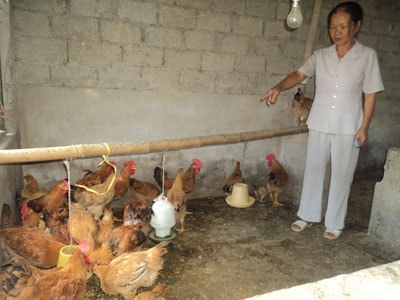Khai Son with biosafety chicken farming model
With the attention of the Department of Science and Technology, the Department of Agriculture and Rural Development of Anh Son district (Nghe An) coordinated with the Farmers' Association of Anh Son district to organize the implementation of a biosafety chicken farming project in Khai Son commune. This is the second time (previously in 2008) that Khai Son commune was chosen as a pilot site for the biosafety chicken farming model.
(Baonghean) -With the attention of the Department of Science and Technology, the Department of Agriculture and Rural Development of Anh Son district (Nghe An) coordinated with the Farmers' Association of Anh Son district to organize the implementation of a biosafety chicken farming project in Khai Son commune. This is the second time (previously in 2008) that Khai Son commune was chosen as a pilot site for the biosafety chicken farming model.
The biosafety chicken raising model under the project has an investment scale of 150 million VND. The implementation started by selecting from poor households, including 37 households. These households have the ability to ensure good chicken raising, have a clean and airy barn system, voluntarily participate in raising and are unanimously approved by the Party Committee and the village front. After being trained in techniques and raising processes as well as disease prevention and treatment, starting from April 2011, households were given chicken breeds to raise according to the model. The main chicken breed is ri chicken (domestic chicken) taken from the Institute of Science and Technology, 1-day-old weight with a total quantity of 1,850 chickens.

Ms. Nguyen Thi Nam is excited with her flock of chickens raised under the project model.
Participating in the project, farmers are supported with 50 chicken breeds per household (price 10,000 VND/breed) equivalent to 500,000 VND/household, 170 kg of bran/household and nearly 4,000 doses of disease prevention vaccine. Basically, raising ATSH chickens must ensure the factors of the barn and regular and timely vaccination, carefully monitor the development process of the chicken flock to be able to prevent disease well, avoid the highest level of disease.
Up to now, after 3 months of raising chickens according to the project model, on average, a chicken in the farmer's coop weighs from 1.8 to 2 kg. Ms. Nguyen Thi Nam in Hamlet 2 said: Raising chickens for 3 months costs 20000 VND worth of corn, 90 thousand VND for vaccination, rice and wine lees for chickens, the total cost is about 300 thousand VND. With the current economical selling price (100 thousand VND/kg of chicken), she earned a net profit of nearly 7 million VND in 3 months of raising. Households raising ATSH chickens according to the project in Khai Son have an average income of 5 million VND/household/3 months, the total income from the model reaches over 180 million VND.
Luong Mai
